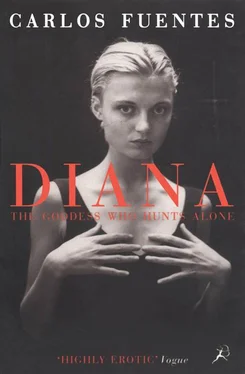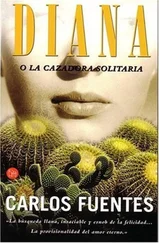Carlos Fuentes - Diana the Goddess Who Hunts Alone
Здесь есть возможность читать онлайн «Carlos Fuentes - Diana the Goddess Who Hunts Alone» весь текст электронной книги совершенно бесплатно (целиком полную версию без сокращений). В некоторых случаях можно слушать аудио, скачать через торрент в формате fb2 и присутствует краткое содержание. Год выпуска: 2012, Издательство: Bloomsbury UK, Жанр: Современная проза, на английском языке. Описание произведения, (предисловие) а так же отзывы посетителей доступны на портале библиотеки ЛибКат.
- Название:Diana the Goddess Who Hunts Alone
- Автор:
- Издательство:Bloomsbury UK
- Жанр:
- Год:2012
- ISBN:нет данных
- Рейтинг книги:3 / 5. Голосов: 1
-
Избранное:Добавить в избранное
- Отзывы:
-
Ваша оценка:
- 60
- 1
- 2
- 3
- 4
- 5
Diana the Goddess Who Hunts Alone: краткое содержание, описание и аннотация
Предлагаем к чтению аннотацию, описание, краткое содержание или предисловие (зависит от того, что написал сам автор книги «Diana the Goddess Who Hunts Alone»). Если вы не нашли необходимую информацию о книге — напишите в комментариях, мы постараемся отыскать её.
Diana the Goddess Who Hunts Alone — читать онлайн бесплатно полную книгу (весь текст) целиком
Ниже представлен текст книги, разбитый по страницам. Система сохранения места последней прочитанной страницы, позволяет с удобством читать онлайн бесплатно книгу «Diana the Goddess Who Hunts Alone», без необходимости каждый раз заново искать на чём Вы остановились. Поставьте закладку, и сможете в любой момент перейти на страницу, на которой закончили чтение.
Интервал:
Закладка:
Lots of friends were at Eduardo Terrazas’s house that Feast of Saint Sylvester, December 31, 1969. José Luis Cuevas, the extraordinary artist whose painful embrace includes all the marginal, excluded visions of desire, along with his wife, Berta. Fernando Benítez, my good and old friend, the great promoter of culture in the Mexican press, the novelist, the explorer of the invisible Indian Mexico, and his wife, Georgina. At the age of thirty-five, Cuevas was a wildcat whose pretense to urbane manners barely camouflaged his savage, nervous nature, for he was always on the point of pouncing on some prey as hot-blooded as he to tear it to pieces, devour it, all so he’d be left with the sensuality of being able to imagine doing it again. Was there a murderer in him sublimated by art? I always thought so, just as in Benitez — a sensualist if ever there was one, a sexist, a man who adored women but was a misogynist and hermit — there was a Franciscan monk, a Bartolomé de las Casas, redeemer of the Indians, one of those monks who came to the New World to save souls and protect bodies as soon as the conquest of Mexico was finished. It was possible to imagine him driving a BMW convertible at top speed toward Acapulco and an orgiastic weekend, but it was equally possible to see him riding a burro up some inhospitable mountain where there awaited him not lost tribes but the bacteria that was destroying his stomach, his pancreas, his intestines …
New Year’s Eve. This passage from 1969 to 1970 was worthy of celebration because it marked the end of one decade and the beginning of a new one. But no one agrees about what that final zero means at the end of a year. Were the 1960s coming to an end and the 1970s beginning, or were the 1960s demanding one more year, a final agony of partying and crime, revolt and death, for that decade replete with major events, tangible and intangible, guts and dreams, cobblestones and memories, blood and desire: the decade of Vietnam and Martin Luther King, the Kennedy assassinations and May 1968 in Paris, the Democratic convention in Chicago and the massacre in Tlatelolco Plaza, the death of Marilyn? A decade that seemed to be programmed for television, to fill the sterile scheduling wastelands of blank screens but leave them breathless, making miracles banal, transforming the little electronic postage stamp into our daily bread, the expected into the unexpected, the facsimile of reality that culminated, even before the 1970s had begun, in mankind’s first step on the moon. Our immediate suspicion: was the flight to the moon filmed in a TV studio? Our instantaneous disenchantment: can the moon go on being our romantic Diana after a gringo leaves his shit up there?
More guests arrived. China Mendoza, journalist and writer, who had a spectacular sense of self-affirmation during the 1960s. In that decade of outrageous styles, she wore clothing she seemed to have invented on her own, not copied from a fashion magazine. That night I remember her decked out in silver glasses shaped like butterflies and a miniskirt that was actually pajamas, a pink ruffled babydoll that revealed matching panties.
Rosa, the incredibly beautiful widow of the artist Miguel Covarrubias, came with a New York art dealer who looked exactly like the actor Sydney Greenstreet — that is, he was immensely fat and old, bald, with tufts of white hair here and there, eyebrows thick as caterpillars, and liver lips. Rosa was wearing one of her golden Fortuny dresses that rolled up like a towel and unfolded like a flag proclaiming My country is my body. On the verge of death, Rosa Covarrubias belied her age. She, too, belonged to that pantheon of Mexican beauties, those “immortal skulls,” as Diego Rivera called them when he painted Dolores del Río. How right he was. The bones of the face never grow old; they’re the paradox of a death that by definition has no age, borne like the secret insignia of beauty and its price. Luisa Guzmán — I saw her walk off and go up the stairs — belonged to that race. The closer the bone was to the skin, the more beautiful the face. But the more visible was death as well. Beauty lived off its imminent dying.
Along with Rosa and Greenstreet came three English marchands de tableaux who stared in shock and disgust at the Mexican men embracing, slapping one another on the back, and grabbing one another by the waist. Englishmen find touching repugnant and recoil in horror at the merest brush with someone else’s skin. Their ideas about climate and temperature are also singular, and one of them, the spitting image of Prime Minister Harold Wilson, recited the very lines from Byron I had just remembered: “The English winter — ending in July, / To recommence in August.” He added that it was very hot and opened a window.
Terrazas had decorated his house with myriad balloons strung from the ceiling in expectation of the moment of passage from one year to another. The balloons were stamped with the logo of the 1968 Olympiad, which Terrazas himself had designed. Just as the clock was striking twelve, Berta Cuevas, to announce the new year, touched her burning cigarette to the cluster of balloons that Terrazas had bunched together to imitate the traditional twelve grapes of the celebration. She didn’t know the balloons had been inflated with gas. The explosion went off like a muted earthquake and threw all of us to the floor or against the walls, swept the tables clean, turned over chairs, and knocked pictures cockeyed.
A seventeenth-century carving fell right on Greenstreet’s head, and all the rest of us — Rosa, Georgina and Fernando Benítez, Cuevas and Berta, China, and I — were blind to one another, aware only of our individual selves, of our brush with death, of the instantaneous surprise of the accident, of the cancellation of all questions but one — Am I alive? Then came moans, anger, pain. We were all completely flabbergasted. We stood there with our mouths hanging open and then began to laugh as the three Englishmen, no longer so nonchalant, peered into the mirror to make certain of their existence and found their faces dotted with pieces of balloon bearing the logo of the Mexican Olympiad of 1968. They looked like three explorers suddenly transformed by the sorcery of a tribal sacrifice into priests tattooed by the very rites they’d come to exorcise. One of them— I’d recovered my senses — saved our lives by opening a window to let in a breeze that came, no doubt about it, straight from the Scottish Highlands.
Luisa saved herself and her impeccable appearance: she’d gone up to the powder room and now came back down in alarm. Just at that moment, the front door opened, and Eduardo Terrazas walked in with Diana Soren, whom he’d gone to fetch from another party.
“Are we too late?” asked our host, watching us, dazed, get up from the floor.
V
Can you extricate yourself from one romance and get into another without hurting someone? This is just one simple example of the myriad questions you ask yourself when you suddenly realize something’s going to begin at the expense of something that’s going to end. She was small, blond, with boyishly cut hair, fair, pale, with blue or perhaps gray eyes, very jolly eyes, that nicely matched her dimpled cheeks. Her dress wasn’t very attractive: a long Greco-Californian evening gown, which didn’t suit her because it made her seem shorter than she was, like a thumbtack.
I — who else? — remembered her from her two major films. In both, Diana Soren used her adolescent physique to full advantage by dressing as a man. First she was Joan of Arc, and the armor allowed her to move with energy and fluidity, comfortable in war as she never would have been in a court of hoop skirts and white wigs, armed to fight like a soldier, dressed as a soldier. In the bonfire, she would pay dearly for the privilege, accused of witchcraft but also perhaps, silently, of lesbianism and androgyny. In the only good movie she made after that, in France, she was a girl in a T-shirt and jeans running back and forth on the Champs Elysées waving her copy of the Herald Tribune … Loose, free, the warrior maiden of Orléans or the vestal virgin of the Latin Quarter, adorably feminine because to get to her you had to negotiate the twists and turns of androgyny and homoeroticism. On the screen, I’d always seen Diana Soren with an unwritten subtitle: There is the love that dares not speak its name, but there is something worse, which is the love without a name. What name can I give the possible love with this pure possibility which entered the 1970 New Year’s Eve party after a gas explosion and which was called Diana Soren?
Читать дальшеИнтервал:
Закладка:
Похожие книги на «Diana the Goddess Who Hunts Alone»
Представляем Вашему вниманию похожие книги на «Diana the Goddess Who Hunts Alone» списком для выбора. Мы отобрали схожую по названию и смыслу литературу в надежде предоставить читателям больше вариантов отыскать новые, интересные, ещё непрочитанные произведения.
Обсуждение, отзывы о книге «Diana the Goddess Who Hunts Alone» и просто собственные мнения читателей. Оставьте ваши комментарии, напишите, что Вы думаете о произведении, его смысле или главных героях. Укажите что конкретно понравилось, а что нет, и почему Вы так считаете.












